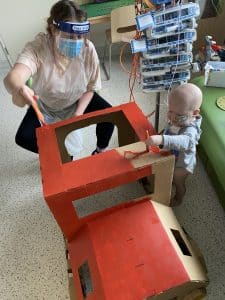The sound of ukuleles playing and displays of colourful children’s artworks are the kinds of things you would expect to find at a childcare centre or a school. They are also commonplace at The Royal Children’s Hospital (RCH).
Known for providing world class treatment in a world class facility, the RCH also ensures children and young people receive more than just outstanding clinical care through comprehensive and supportive initiatives like the CARES (4 Kids): Cancer Allied Health Resources, Education and Supportive Care program.
The CARES (4 Kids) program, funded by the RCH Foundation, provides holistic care for children and young people undergoing treatment in the RCH Children’s Cancer Centre (CCC).
As a leading provider of paediatric cancer services in Victoria, the CCC encompasses both inpatient and outpatient services, and includes an integrated multidisciplinary team of specialist oncology medical, nursing, allied health, supportive care and research staff provide holistic care to children, adolescents and their families.
One component of CARES (4 Kids) is the Comfort First program, which aims to reduce patient procedural pain and distress during cancer treatments through play and education. Fully integrated within the CCC, it is considered a fundamental part of patient care and aims to empower children and families by teaching coping strategies and building on their existing strengths to help reduce distress and anxiety throughout treatment
When children are hospitalised frequently, or for long periods, they are at risk of falling behind in their schooling and social development or suffering from the psychological impacts of their condition. Programs like play and art therapy, which also form part of the CARES (4 Kids), ensure children continue grow and learn during their hospital stay, not only providing an important distraction from pain, but also stimulating brain development and fine motor skills.
“Art therapy can be used as an effective modality for self-expression, self-regulation and for processing the experiences of hospital and illness through a creative form. It allows choice and control for patients in a situation in which they have minimal control,” said Matilda Dawson, Art Therapist at the RCH.

“Art making can be a starting point for art play, with the art therapist opening up the possibility of endless creative opportunities. Maintaining relationships with family and friends at home is another key aim of art therapy for patients, creating work for family members or art packs for siblings or caregivers to join in from home,” she added.
To best provide psychosocial and emotional support, cognitive and developmental support, and both physical and functional support, music therapy programs are tailored to individual patient’s strengths and needs, utilising preferred and familiar music that the patient and their family identify as personally meaningful.
For music therapist Lauren Miller, actively engaging in a personalised music therapy program can connect children with elements of their life or self, prior to diagnosis and hospitalisation, and provide ongoing support throughout their treatment journey.
“Engaging in an activity that is positive, meaningful, and personal, creates an experience for the child with an emphasis on the child themselves. Active engagement in positive and meaningful activities enables children in hospital to develop trusting relationships with staff, and support healthy coping skills, leading to increases in a child’s confidence and mastery of the hospital environment and aspects of their treatment,” she said.
The impact of the CARES (4 Kids) program on CCC patients and their families is immense, and CCC Operations Manager, Karli Williamson, could not be more thankful to those whose generous support made it possible.
“The psycho-oncology program and the CARES (4 Kids) grant hold immense significance in the CCC as they provide essential support for paediatric cancer patients and their families, addressing their emotional and psychological needs throughout their difficult journeys. We are truly grateful for the generosity of the people who have supported this program. Thanks to them, we can make a positive difference in the lives of these children, young people and their loved ones, empowering them with strength and resilience to face the challenges of cancer with hope and determination,” she said.